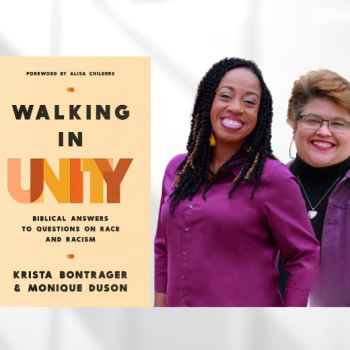
Should churches continue to utilize the term “Special Needs” for their ministries or designated spaces for those with neurological conditions and or disabilities? Are there better terms than “high functioning” and “low functioning” when it comes to discussing Autism? What are some practical ways churches can help put Autistics and others with neurological conditions at ease?
By looking at what God says about our identity and labels, we will see if our current terms can be improved upon to best show love for our neurodiverse brothers and sisters.
Remember Who We Are and Whose We Are
First and foremost, if we must be labeled then let the record state:
We are Christ followers, and image-bearers of God before anything else.
These descriptors, the former for Christians and the latter for all, are what truly matters.
To stay on mission for this article, we will not be discussing race, gender, etc. My brief view on those things is that while they are important qualities, they do not comprise our entire essence.
For a brilliant ministry that diligently pursues clarity on unity with love, humility, and scholarship, I highly recommend the Center for Biblical Unity’s podcast, blog, and YouTube Channel. Monique and Krista are gifted and gracious in sharing their story and resources.
Instead of listening to who the world says we are or ought to be, we must look to Scripture for Who and Whose we are. There is a difference between our God given identity, and man made labels to describe a neurological condition or disability.
Here is what Scripture has to say on the topic of identity:
1. We are all equal. (Gal. 3:28)
2. We are fearfully and wonderfully made. (Ps. 139:14)
3. We are loved by God. (John 3:16)
4. We were bought with a price on account of our sin and the grace of Jesus Christ. (1 Cor. 6:19-20)
5. We have gifts to bring God glory and serve the Kingdom. (1 Cor. 12)
6. We have belonging. (Eph. 2:13)
Of course, this list does not encompass all that God has to say on the matter!
Labels… Guides Not Guarantees
Neurodiversity carries a lot of labels to the table, and I am proposing, given the Bible-based information above, that Christians be careful to place our identity in Christ above all the labels.
By doing this, I think two things will happen.
- One, I think we will see others as God meant for us to see them, as His.
- And two, if we ourselves are neurodiverse, we will know our inherent value and worth to God.
After our family’s horrific accident where I sustained a brain injury, I was led to seek help from a neurologist, psychiatrist, and neuropsychologist. As I was coming to terms with it all, I realized that the baseline I was trying to return to, might not have been a typical one to begin with.
It was at one of these appointments, that I was given the diagnosis of ADHD along with a prescription. I tried to take the meds and had a horrendous reaction. So I stopped the meds, prayed and followed the suggested reading protocol to heal my brain.
Currently, I do not think (pun intended) too much about whether I have ADHD or not, I just live, but I do see some value in having insight into how my brain works.
Here are some of the ways that this label is helpful:
- I’m able to be a bit gentler with myself when my thought wanderings lead me to fanciful places.
- I know I need to be much more proactive in planning.
- Maybe not the label itself but ADHD, for me, means I might have more capacity for creativity. I love that about my ADHD brain.
Let’s Hold Our Labels Loosely
Labels like these should be seen more as guides than guarantees on what we are or are not capable of. Ultimately, God decides because He made us.
Think about all the lives that could be spared by a loose holding of labels. I am speaking about aborting babies who have Down’s Syndrome or are otherwise cognitively impaired. Remember, these are lives that matter to God.
He gets the say on their worthiness.
Lives over labels.
Diagnoses do not define us.
It is Time to Update the Term: “Special Needs”
While labels do not have the say in who we are or what we can do, words still communicate a great deal and are important tools. Since we are on the subject, let’s take a gander at a few terms that should be updated in our churches.
Last year I noticed something.
Every time I said the words, “special needs” around one of my autistic loved ones, they cringed. Naturally, this led me to question the term and the cringe it brought forth.
“What is the problem with saying ‘special needs’”? I inquired.
“Those who are disabled and or neurodiverse simply have needs like everyone else. In other words, they are not any more or less special than anyone else’s.”
I have no clue why I did not think of this.
I see a lot of churches doing their diligence in training their staff, offering sensory friendly environments, etc. which is why I am suggesting we do our best in providing terminology to match those efforts.
Changing words is a huge ordeal that should be done rarely and never on a whim or capriciously, but maybe we can improve in this area.
Here are some suggested replacement terms for “special needs”:
- Sensory Friendly
- Disability Friendly
- Disability Ministry (Encompasses more than neurodiverse conditions)
- Neurodiverse Ministry
- Support Needs
Staying on the terms trend…
High Functioning or Low Functioning?… A Better Option
Describing an autistic person by how well they function is a major problem in need of course-correction.
Let’s look at what Temple Grandin, someone with ASD and a huge presence and help in the world of Autism Spectrum Disorder, has to say:
“In my more recent lectures and the most recent edition of The Way I See It, I no longer use the terms ‘high functioning’ and ‘low functioning’ autism. For autistic children over age six, I use the terms ‘verbal and non-verbal.'”(https://www.templegrandin.com/faq.html)
Once widely used, the term “Aspergers” is now out of play due to its namesake’s roots in eugenics.
In talks with others, I have had many questions asked about whether or not an autistic person I know is “high functioning” or not.
Would we blatantly ask how well people function if they were not on the spectrum?
This grieves my heart. While I know the intent of those who ask mean well and I try to extend grace hearing, “Oh they must be high functioning, right?” is nothing less than jarring.
What if the answer is “no?”
Or when I meet a mom who tells me their child is on the spectrum, or might be say about their own child, “They’re high-functioning.”
I think people say this to offset the information they’ve received, almost like they are trying to make the conversation more comfortable.
But should we be so uncomfortable about a very common condition that people live everyday with?
Assessing levels and using these terms places us in the judgment seat of a person’s capabilities. It brings the labels above their identity.
Yes, there are limitations that come with ASD and ADHD and many other neurological conditions. To say that there are not would be unrealistic and unhelpful.
However, generally speaking, everyone has limits. Everyone has some high-functionality in areas and low-functionality in others.
Instead of saying, high or low functioning, we can say: support needs or verbal and non-verbal or many people actually prefer using the term: disabled. This way we can address the needs without quantifying a person’s capabilities.
Our Posture as Believers
Believers especially do not need to know how Autistic someone is or isn’t. Autism is a spectrum, or even circular as some say. Let us just leave it at that. Or better yet, let that be between their doctor and the patient and their family.
I think our goal upon meeting someone should be to find out who the person God created them to be is regardless of whatever they have going on neurologically. Again, it is important and we should do what we can to help them, but we should remember it is not their entire being.
Turn Down the Music & Turn Up the Grace
Here we get to practical actions we can take as the Church.
Number one plea: Turn. The. Music. Down. Please.
Do you know where the loudest music I hear all year is? VBS.
Every year, we have to leave a VBS or two early or we cannot complete the week because of the sound being over the top. And it is not just for those who have ASD or sensory processing disorders, no. It is too loud for every kid and adult in there.
But it is especially severe for people who are extremely sensitive to sounds and other sensory stimuli. Add lights to the insane decibels and you are immediately repulsing a large chunk of kids who might be Autistic, SPD, and just do not know it.
The Sensory Shut Down
I purposefully watch children walk into these camps with music BLARING and lights flashing and see their eyes glaze over, becoming silent as they try to process all the input.
It is too much. And it shuts people down.
Please. How does this volume help? I am sure audiologists do not advise this for the general public either. Call me Karen, an old-millennial and or a mama-bear, I do not care, but all I know is: this is not the way.
I researched what the normal decibel level is for contemporary church worship, and saw the average answer of about 90-95 dB. 95 dB is the loudness of a motorcycle engine roaring past you.
That is 20 decibels over the recommended amount. The CDC says this:
“Noise above 70 dB over a prolonged period of time may start to damage your hearing. Loud noise above 120 dB can cause immediate harm to your ears.”
Could the problem is whoever runs the sound might already have damaged hearing and thus, they keep turning it up to hear it for their own ears? I sincerely appreciate those who volunteer or work in the sound, but will you stop and consider that this is doing damage to children especially?
OH NO, did I just lament, “Think of the children!”?
Sound Can Actually HURT Some Autistic People
Have you ever talked to someone at the end of church and they seem unable to focus or look at you? Almost like they have shut down and are no longer able to communicate? They might be on the spectrum.
From National Autistic Society:
“Sometimes an autistic person may behave in a way that you wouldn’t immediately link to sensory differences. A person who finds it difficult to process everyday sensory information can experience sensory overload, or information overload. Too much information can cause stress, anxiety, and possibly physical pain. This can result in withdrawal, distressed behaviour or meltdowns.”
A Sound Solution
- Turn it down. Yes, even Church Clap (I know, I love that song too!).
- Offer headphones and or sunglasses to help with the sensory assault.
We Say Grace, But Can We Give It?
Lastly, Church. I love you. I am deeply rooting for you as your teammate. I mean, hello, I am in the Body with you! Can we just give grace and “love our neighbor” regardless of their abilities or even their ability to reciprocate?
For a beautiful insight into an Autistic person’s time at church, I recommend reading this article from the Gospel Coalition. He goes into thoughtful ways to help people with ASD with such a loving heart.
Here are some examples which are not meant to condemn or promote unattainable perfection.
Facial Expressions & Reciprocation:
People on the spectrum may not always be able to show the facial expressions you require to carry on a conversation. Does that make someone less worthy in the eyes of God? NO. You might have to trust that if you do not get any facial feedback, it is okay. They do want to talk to you, they just might not be able to show it. Their reactions might be flat responses, not smiling, and little to no eye contact at times.
Can we be okay with that?
Playing the Social Game:
When you think about it, conversations and social events have unmentioned rules formally known as: “social cues.” The problem is that because they are unmentioned they are unclear to people on the spectrum. Therefore, they tend to not adhere to the rules not willfully, but because to them there are none.
Autistics especially need CLEAR instructions. If someone did not know how to play a game, wouldn’t you take the time and help them learn?
Stop Forcing Active Worship
This is a biggie. If you are a worship leader or work in children’s or students’ ministry, please do not force someone to stand up and sing or dance. This is not acceptable, and heaps feelings of shame and inadequacy upon a person.
What if they are trying to make it through the service and onslaught of sensory input? What if they are afraid or just taking everything in and trying to process it?
Please do not say someone is “being grumpy” or “rude” if they are not willing to actively participate. That is not loving and, in most cases, inaccurate.
Listen, I serve in students’ ministry, and yes, sometimes kids can act rudely (not in my group though!). This is always a clue that there might be something more going on in their home, or perhaps they do have a social communication disorder. The point is: take the time to get to know them as a person and see. Do not give up on them. God has brought them there for a reason!
Growing the Garden of Others
We are told in Galatians 6:9-10, “Let us not become weary in doing good, for at the proper time we will reap a harvest if we do not give up. Therefore, as we have opportunity, let us do good to all people, especially to those who belong to the family of believers.”
Lord, help us with this. As Your Word says: “to all people.” I want to see the fruit and flowers of everyone. Don’t you? Some might take longer to bloom, but they are no less sweet and beautiful.
Jesus may be giving you a chance to show His love to your neurodiverse neighbor. Please, take it.













